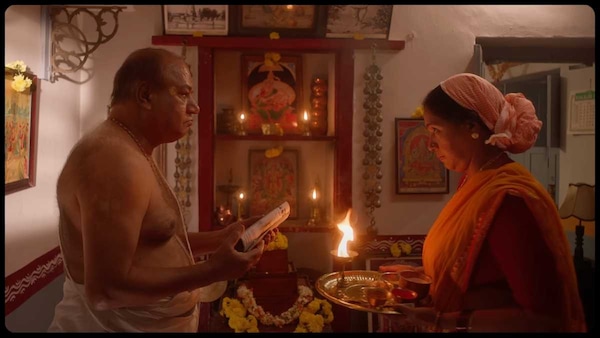Aachar & Co review: Sindhu Sreenivasa Murthy’s tale of 60s Bengaluru is simple, but doesn’t strike a chord
Aachar & Co is set in 1960s Bengaluru and follows the family of Madhusudan and Savitri Aachar and nine of their 10 children.

Last Updated: 10.38 AM, Jul 29, 2023
Story: Civil engineer Madhusudhan Aachar (Ashok) and his wife Savithri (Sudha Belawadi) live with nine of their 10 children (the eldest daughter was married off at 16) in their home in Jayanagar. The boys (three of them) are encouraged to become engineers like the father (which they don’t), while for the girls, higher education is an optional subject that is left to them in the hope of getting a well-educated groom. When Madhusudhan dies on the job, everyone then becomes responsible for contributing towards the running of the household.
Review: The big selling point of Sindhu Sreenivasa Murthy’s directorial debut Aachar & Co was that the story is set in 1960s Bengaluru, a time when, according to her, “industrialization took off, bank nationalisation happened and women began to give education and employment more importance”. In terms of story-telling, the film could have been set in any period; here it only serves as a justifiable era for a family having 10 kids and for protagonist Suma (Sindhu) being able to teach pre-primary kids despite not being matric pass.

Aachar & Co’s story spans over a decade, during which, one sibling is packed off to Delhi, never to be heard from again; while another has such a massive growth spurt in only two years that the team had to have another actor play the ‘older’ version. And Suma’s only change in these 10 years is that she goes from sporting two braids to a bun to reflect her more grown-up status. I could be wrong, but I thought there were inconsistencies in the timeline too, with Suma going from a uniform clad school-goer to a 27-year-old (as mentioned) in less than 8-9 years.
The whole premise of the film builds on the death of family patriarch Madhusudan and how his children then deal with the situation. The luxuries they could afford while he was alive - car, servant, etc. - are lost the minute he is out of the picture. Strangely enough, no one in the Madhusudan family becomes beneficiary of the government’s compassionate employment scheme, which began in 1958, way before the events of the film. Technically, all their problems would have been solved, but then there wouldn’t have been a story to tell. Either the filmmaker chose to omit this or just didn’t know that one dependent family member could have got a government job at a level based on his/her qualification. So, as the Aachar kids find their bearings, the film then throws in stuff about women’s empowerment and gender equality, among others.
Aachar & Co is not a tedious watch; it is a tad under two hours in run-time, has got a clean U censor certification and has got the casting spot on. The actors, most of who are newbies, do their limited jobs well, but none of the characters, however, have scope to leave an impression. Everything feels a little perfunctory, including the neighbourhood gossip monger trio. The music is nice, but take out either or both of the songs – Bengaluru Suprabhata and the Pickle Song – and it doesn’t disrupt the narrative.
Verdict: Aachar & Co is a simple, no-frills movie, but it doesn’t really fill one with a heartwarming sense of nostalgia.
Subscribe to our newsletter for top content, delivered fast.

